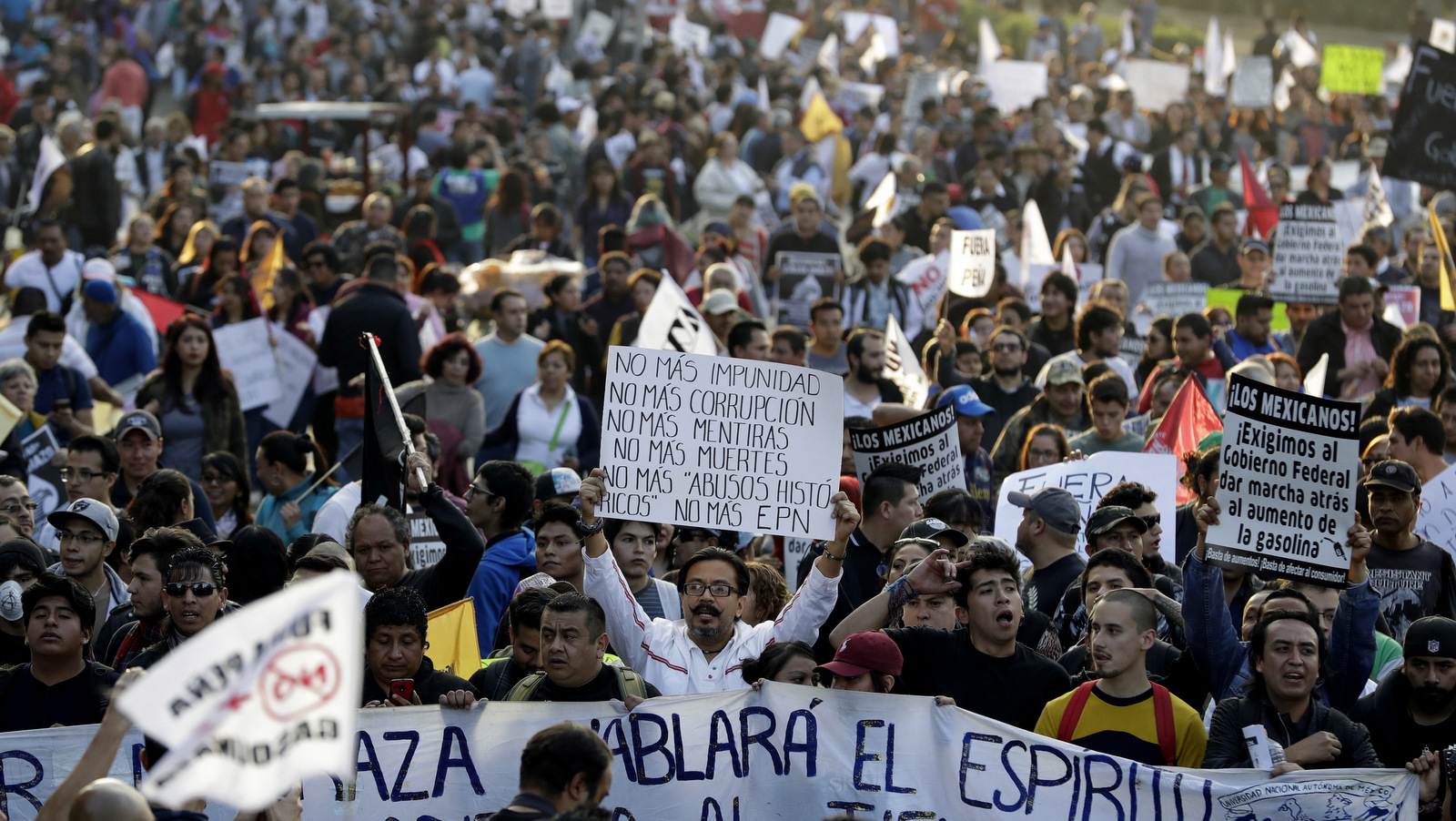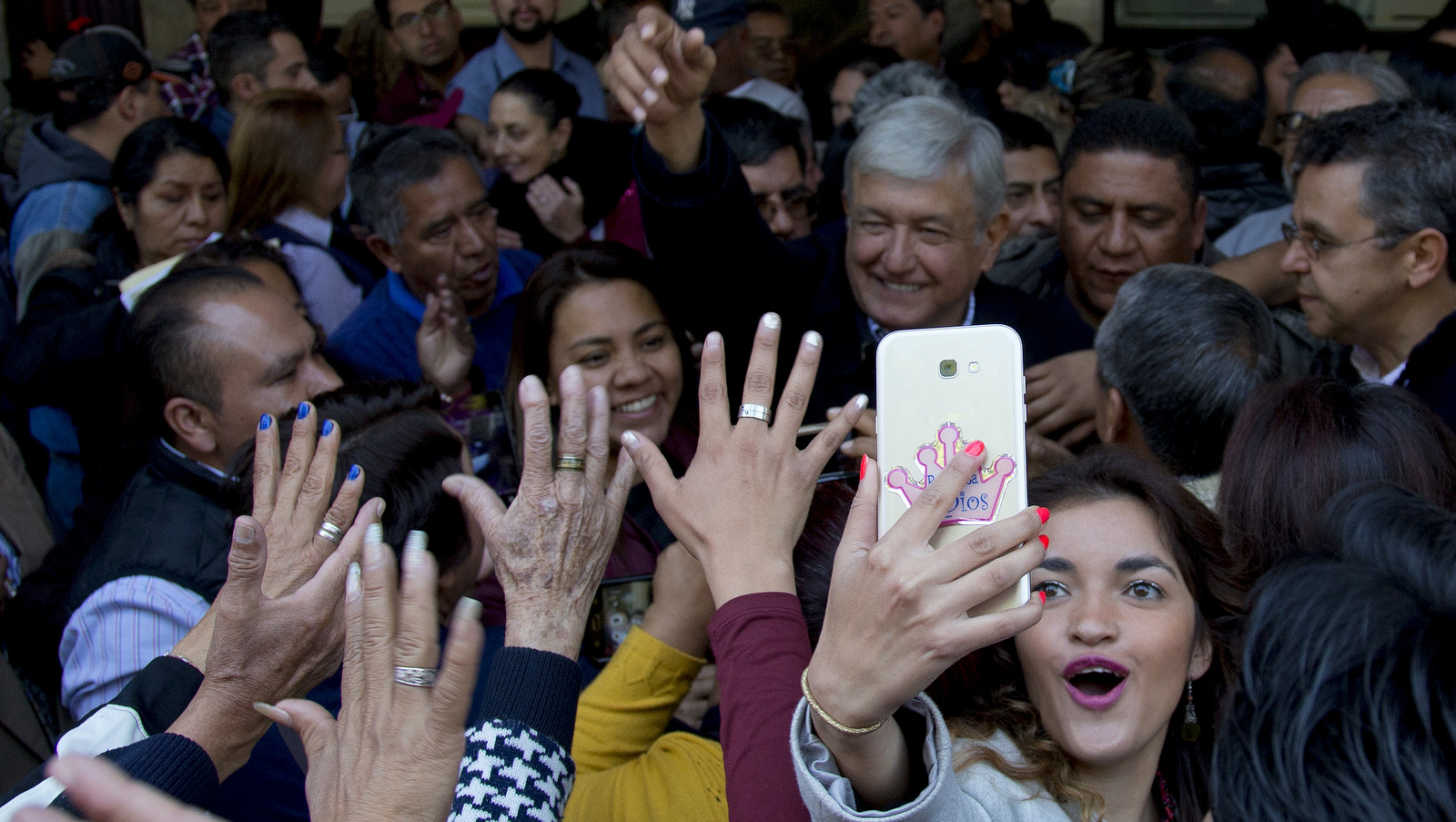MEXICO CITY — Facing a raft of problems — including organized crime, growing violence, deepening poverty, a healthcare crisis and rampant corruption — voters in Mexico are preparing to abandon the duopoly that has governed the country for nearly a century to elect as president a Bernie Sanders-like populist.
The results of a public opinion survey published Thursday are consistent with previous polls showing former Mexico City Mayor Andres Manuel Lopez Obrador with a commanding lead over the field ahead of the July 1 presidential election. Should his lead hold up, Lopez Obrador’s National Regeneration Movement, known by the Spanish acronym MORENA, will break the electoral stranglehold of the Institutional Revolutionary Party (PRI) — which was born out of the the Mexican Revolution, but made a turn to neoliberalism in recent years — and the National Action Party (PAN), a corporatist right-wing party that interrupted the PRI’s 71-year rule with the election of Vicente Fox in 2000.
So dominant are the two parties that commentators often refer to the “PRIAN” consensus, employing a portmanteau of the two parties’ initials.
Mexican voters tired of corruption, decline in living standards, Trump’s bullying


A man carries a sign reading in Spanish “No more impunity, no more corruption, no more lies, no more death, no more ‘historic abuses,’ no more EPN,” as thousands marched in anger against the government of Enrique Pena Nieto following a 20 percent rise in gas prices, in Mexico City, Jan. 9, 2017. (AP/Rebecca Blackwell)
The Grupo Impacto poll published Thursday makes clear that voters favor the leftist Lopez Obrador, who has pledged to root out government corruption and invest more in infrastructure projects, health, education and social programs without raising taxes. Similar to their working class peers north of the border, Mexicans have seen their living standards decline since the passage of the North American Free Trade Agreement in 1994. Simultaneously, lawlessness and human rights violations in post-NAFTA Mexico have skyrocketed, as politicians from the PRI and PAN have served the interests of narco-traffickers, criminal cartels, and a corporate elite in the U.S.
And making matters even worse is a bellicose President Trump, whose constant bullying and proposal to militarize the border between the two countries has stoked nationalist sentiment among Mexicans. President Enrique Peña Nieto issued a statement Thursday strongly repudiating Trump’s rhetoric toward Mexico, and calling for mutual respect between the neighboring countries. The unpopular Peña Nieto has come under increasingly harsh criticism for his defense of Mexican sovereignty and dignity that many here see as too little, too late.
The 64-year-old Lopez Obrador, who has twice run unsuccessfully for the presidency, is the most visible leftist politician in Mexico and has largely benefitted from the public’s disapproval of Peña Nieto’s handing of relations with their northern neighbor The leftist candidate has maintained that Trump’s attacks are grounded in the U.S. president’s efforts to shore up domestic support and suggested that Trump’s behavior has been enabled by the tepid responses of Peña Nieto.
Read more by José Luis Granados Ceja
- Human Rights in Mexico, From Crisis to Catastrophe
- Under the Shadow of Violence and Repression, Mexican Women March for a Change to the System
- Honduras: Arrest in Caceres Murder a Feeble Attempt at Image Rehab
“Our country, our people, will not be a piñata of any foreign government,” Lopez Obrador told a crowd of supporters at a campaign rally Thursday in the northern city of Laredo.
Throughout the campaign he has consistently tried to reassure voters that Mexico would chart its own course under his leadership, and his government would not be overly influenced by any foreign actors.
“Let’s be very clear, we are not inspired by any foreign governments, neither Maduro nor Trump,” Lopez Obrador told reporters last year, referring to Venezuela’s socialist President Nicolas Maduro and U.S. President Donald Trump.
The most recent poll showed 43 percent of respondents indicating their support for Lopez Obrador’s coalition, followed by Ricardo Anaya, a former PAN lawmaker, at 19 percent.
In third place is Jose Antonio Meade at 13 percent. Meade was chosen by the PRI to lead its coalition despite the fact he was not an active member of the party and had served as a government minister under the PAN presidency of Felipe Calderon. The race is rounded out by Margarita Zavala at 9 percent. Zavala was first lady during Calderon’s administration and is the only “independent” candidate to secure enough signatures to appear on the ballot.
When undecided voters are eliminated, Lopez Obrador’s lead jumps to 52 percent to Anaya’s 23 percent. Mexico has only one round of elections and whoever wins a simple plurality of votes is declared the winner.
The Grupo Impacto poll also asked respondents for their second preference if Lopez Obrador had no chance of winning; 40 percent answered no one and 23 percent Zavala.
After a two-term absence, the PRI returned to power in 2012 with Enrique Peña Nieto as its candidate for president. His election was billed as the dawn of a “new” PRI and his promises to implement neoliberal structural reforms were lauded by mainstream media outlets. However, his government quickly became mired in controversy, including the forced disappearance of 43 students, which drew massive protests; a corruption scandal; and allegations that several PRI governors engaged in massive graft.
So disillusioned are voters here that only 20 percent said they would not vote for Lopez Obrador under any circumstances, despite a steady drumbeat of antagonistic coverage from mainstream media outlets.
The impact of the youth vote


A woman takes a selfie backdropped with presidential hopeful Andres Manuel Lopez Obrador during a pre-campaign rally in Mexico City, Dec. 15, 2017. (AP/Eduardo Verdugo)
Lopez Obrador also has strong support from young voters. A second poll by Nacion 321, which tracks the voting intentions of millennials, found that he enjoys 51 percent of support among decided voters. This figure is significant as millennials — voters between the ages of 18 and 36 — constitute 50 percent of eligible voters in this election. Lopez Obrador was also the only candidate with a positive overall approval rating, with 49 percent evaluating him as positive vs. 40 percent disapproving and 11 percent stating they did not know him.
The Grupo Impacto survey was conducted between March 30 and April 3 and interviewed 1,500 voters throughout the country. The poll had a 95 percent confidence level and a margin of error of plus-or-minus 2.4 percent. The Nacion 321 poll was conducted between March 9 and 14, having interviewed 430 people between the ages of 18 and 36 throughout the country. The poll had a 95 percent confidence level and a margin of error of plus-or-minus 4.7 percent.
Top Photo | Presidential candidate Andres Manuel Lopez Obrador embraces his wife Beatriz Gutierrez after formalizing his candidacy at the National Electoral Institute in Mexico City, March 16, 2018. Mexico will hold elections on July 1. (AP/Eduardo Verdugo)
José Luis Granados Ceja is a writer and photojournalist based in Mexico City. He has previously written for outlets such as teleSUR and the Two Row Times and has also worked in radio as a host and producer. He specializes in contemporary political analysis and the role of media in influencing the public. He is particularly interested in covering the work of social movements and labor unions throughout Latin America.
<!–
–>
Source Article from https://www.mintpressnews.com/lopez-obradors-lead-in-polls-means-end-for-mexicos-establishment/240246/
Related posts:
Views: 0
 RSS Feed
RSS Feed

















 April 9th, 2018
April 9th, 2018  Awake Goy
Awake Goy  Posted in
Posted in  Tags:
Tags: 
















